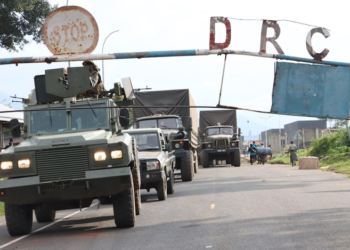By AL JAZEERA
Yemen’s Houthi rebels also announce ‘submarine weapons’, as leader pledges to continue attacks amid Gaza war.
Yemen’s Houthis have announced they have “banned” vessels linked to Israel, the United States and United Kingdom from sailing in surrounding seas, as the rebels seek to reinforce their military campaign, which they say is in support of Palestinians in Gaza.
The Houthi’s Humanitarian Operations Coordination Center sent formal notices of the ban to shipping insurers and firms operating in the region on Thursday, the Reuters news agency quoted a statement as saying.
The Houthis’ communication, the first to the shipping industry outlining a formalised ban in the Red Sea, the Gulf of Aden and the Arabian Sea, came in the form of two notices, Reuters said.
It affects vessels wholly or partially owned by Israeli, American and British individuals or entities, as well as those sailing under their flags.
The warning came amid continuing Houthi attacks that have disrupted international trade on the shortest shipping route between Europe and Asia, and counterattacks by US and British forces hoping to deter the rebels.
The Iran-aligned Houthis have launched repeated attacks on ships in the region since November.
They said the attacks were a response to Israel’s military operations in Gaza, which have killed almost 30,000 people in four months. They have promised to continue their campaign in solidarity with Palestinians until Israel stops the war.
On Thursday, Houthi leader Abdulmalik al-Houthi also said the group had introduced “submarine weapons” in their attacks.
“Operations in the Red and Arabian Seas, Bab al-Mandab Strait, and the Gulf of Aden are continuing, escalating, and effective,” he added in a televised speech.
The Houthis took control of the capital Sanaa and much of northern Yemen in 2014. A Saudi Arabian-led coalition militarily backed the Yemeni government in the ensuing conflict, but the Houthis have continued to maintain their control, and have grown in strength and military capabilities.

Continuing attacks
The Houthi attacks have disrupted international commerce along a route that accounts for about 15 percent of the world’s shipping traffic.
Several shipping companies have redirected their vessels around the southern tip of Africa, delaying delivery times and adding a further 3,000-3,500 nautical miles (5,500-6,500km) to their route.
In response to the attacks, US and British forces began launching air raids on Yemen in January. The US also re-designated the Houthis a “terrorist” group. But the attacks have shown little sign of abating.
On Thursday, the US military’s Central Command (CENTCOM) said it conducted four “self-defence” raids against the Houthis, destroying seven antiship cruise missiles, a mobile ballistic missile launcher and a drone it said originated from areas of Houthi-controlled Yemen.
CENTCOM separately said that one person had been injured after two Houthi missiles hit a British-owned cargo ship in the Red Sea, and added that the US had earlier shot down six Houthi drones in the Red Sea identified as imminent threats to US and allied warships.
Meanwhile, the French navy shot down two drones over the Red Sea, the defence ministry said.
The navy, which has two frigates deployed in the area, detected a threat in the night of Wednesday to Thursday and “destroyed two drones”, it said. Earlier this week, it downed two other drones overnight from Monday to Tuesday.
On Monday, the European Union formally launched a naval mission to protect Red Sea shipping from the Houthis.







Discussion about this post